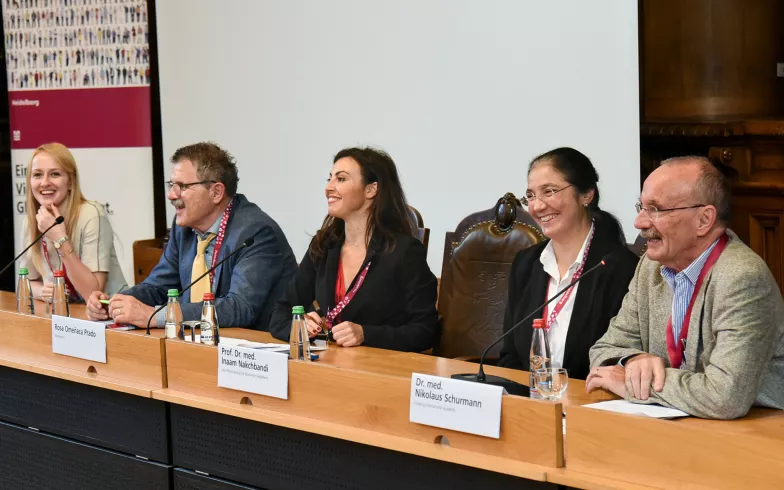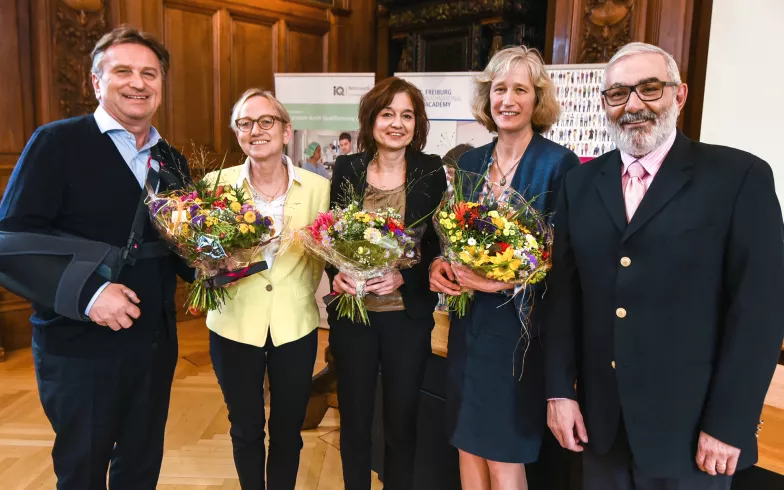Professional Integration of International Doctors

The first conference on "Medigration: Professional Integration of International Doctors" brought together over 100 participants on October 13, 2017, at the Heidelberg City Hall. The conference was organized by the Freiburg International Academy (FIA) in collaboration with the City of Heidelberg and the IQ Network (Integration through Qualification) Baden-Württemberg. The main objectives of the conference were the exchange and networking of various stakeholders and the development of sustainable concepts for the improved professional integration of international medical professionals in Germany.
According to the statistics of the German Medical Association, approximately 46,700 foreign female and male doctors were working in Germany in 2016. To ensure continued comprehensive patient care, our healthcare system is urgently dependent on the immigration of medical professionals, which also poses new challenges.
The Medical Project Manager of FIA, Nabeel Farhan, succinctly summarized the theme of the conference: "Professional integration of international doctors does not end with the completion of FIA qualification measures but begins on the first day of work in the clinic!" In the morning, around 50 experts engaged in workshops, addressing the needs of doctors in the integration process and the expectations from educators, employers, and colleagues.
It became evident that doctors from twelve different countries already had a clear idea of what they needed for better integration. Most importantly, they emphasized the need for an orientation period of at least six months, including a mentoring program and structured, on-the-job training. Another pressing issue was the nationwide networking of foreign doctors to receive support from those who have successfully integrated into Germany.
Regarding success criteria, colleagues had varying opinions. However, there was broad agreement on the statement of a female doctor: "Success is when everyone considers me a full-fledged doctor and not just a foreign doctor. Because I am first and foremost a doctor and only secondarily a foreigner."
On the employer side, the main expectation was autonomy and the rapid deployability of doctors in the clinic. Former clinic directors and professors present unanimously agreed that language skills are fundamental for successful integration. Professor Manfred V. Singer summarized the perspective of clinic leadership very positively: "Many of you will greatly enrich German medicine."
In the afternoon, over 100 guests and participants gathered in the City Hall to present the workshop results. Heidelberg's Mayor for Environment, Citizen Services, and Integration, Wolfgang Erichson, stated: "Our goal is to help people use their qualifications profitably as quickly as possible." Manfred Lucha, Minister for Social Affairs and Integration in Baden-Württemberg, referred to Heidelberg as a lighthouse in its efforts to live and integrate diversity.

Elvira Stegnos, Head of the IQ State Network Baden-Württemberg, expressed satisfaction with the successful networking of all partners, stating, "I hope we have the opportunity to work with the results of the workshops in the future."
Maja Rentrop-Klewitz of the Federal Ministry of Education and Research, who specialized in the department of the recognition of foreign professional qualifications, remarked on the diverging expectations of international doctors and clinics, adding, "The Medigration conference provides a space for exchange on an equal footing."
Rentrop-Klewitz actively sought this exchange herself. For example, Dr. Vicente Severini and his colleague from Colombia had the opportunity to have a detailed conversation with her during the break. Through this discussion, Rentrop-Klewitz gained valuable new perspectives.
Severini later commented, "People in the ministries are not aware enough of the difficulties we face in professional recognition and integration. Information usually doesn't reach the top." Severini had already gained medical experience in surgery and internal medicine in Colombia. He is preparing for the knowledge test at FIA and, in the meantime, obtained a temporary professional permit to work for four months at the Klinikum Stuttgart. He greatly enjoyed the conference, especially because it broke down barriers.
Dina Salem from Cairo also found the conference to be a crucial and positive step, from which she gained a lot. "Until today, I sat only in my room with books and studied. Now I know that it would be good to bridge the waiting time with an internship." It is important not only to have the medical system explained from the outside but also to understand it from the inside.
After obtaining her specialist recognition in Cairo, Salem received an offer for further studies at the University of Pennsylvania with the opportunity to work at the Children's Hospital of Philadelphia. However, she was determined to come to Germany. After learning the language from scratch, she now speaks fluent German and is preparing for her knowledge test. Her conclusion from the conference was, "Today, I felt that we are not alone, but that we are supported and genuinely welcomed."
FIA offers specially designed training programs for international medical professionals and supports them in overcoming linguistic, professional, and cultural barriers.
Text: Johanna Schmidbauer (FIA), Photos: FIA

